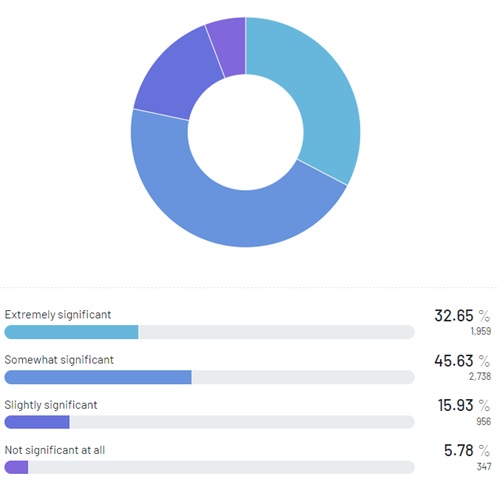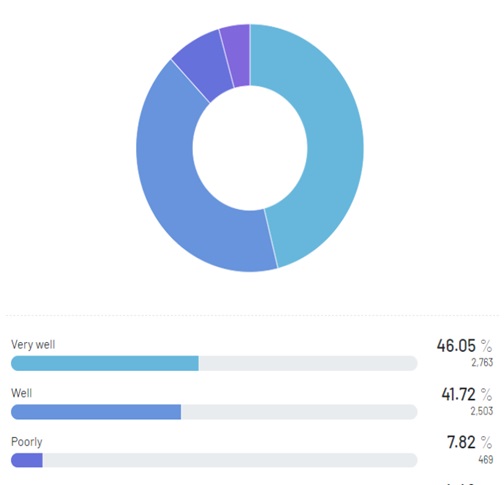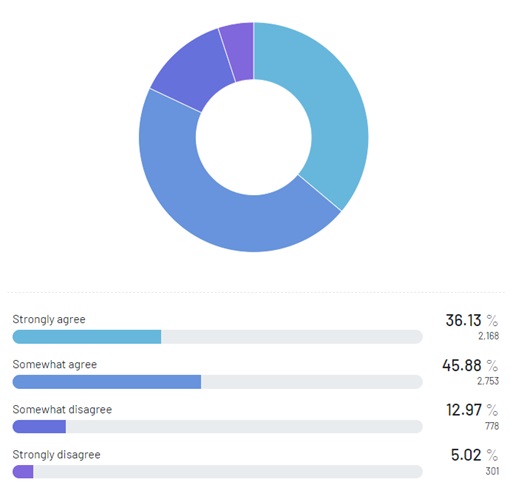
Artificial intelligence has been around since the late 20th century. However, the kind of technology that is seen today shows a more seamless and life-like manifestation of AI—specifically generative AI. Truly, AI has become an indispensable component of contemporary life, remarkably accelerating daily processes and even writing tasks. It has generally shortened such operations from hours to a mere half-minute.
Nonetheless, generative chatbots often fall short of injecting genuine creativity that packs a punch and ensures meaningful dialogue into the writeups requested by a user. Commercially available chatbots today lack consciousness and true intelligence and the swiftness and verbosity of their generated content arguably seem sophisticated on the surface. Yet, these AI language models, which predict the next most likely word in a sentence rather than comprehending nuanced context, typically produce generic and unrelated content.
This is what the Claude 2 chatbot claims to combat. Founded in 2021 by the former executives of the widely popular AI research firm OpenAI, Claude 2 solves the limitations of conventional chatbots by developing and integrating “constitutional AI.” This tool purportedly ensures safe and helpful text generation, which in turn makes it a direct competitor of OpenAI’s widely popular chatbot, ChatGPT.
Concurrently, Anthropic has acquired a plethora of investments and partnerships from various firms in different industries. It has, in fact, recently secured a $2 billion funding commitment from Google, which could easily bolster its stronghold within the AI industry.
In this context, the online survey app Real Research ran a poll on Google’s $2 billion investment in OpenAI’s direct competitor, Anthropic, to gauge the public’s nuanced viewpoints. Take a virtual tour of the article to get a glimpse of the public’s pulse.
Highlights
- 45.63% believe that Google’s $2 billion investment in OpenAI’s rival, Anthropic, has moderate significance for the AI industry.
- 87.77% of participants see Claude 2 competing with more popular chatbots.
- The majority of respondents (82.01%) agree that there is a great demand for language model-based chatbots.
Google Invests $2 billion in Anthropic
Real Research asked 6,000 respondents from all over the world if they’re aware of Google’s commitment to invest $2 billion in Anthropic. Among the surveyed participants, 45.88% declared they were fully aware, while 33.63% had a vague knowledge of the matter. The remaining 20.48% disclosed that they’re unaware of Google’s $2 billion investment in OpenAI’s competitor.

Google’s $2 billion investment in Anthropic
As per a CNBC report, Google will provide Anthropic with an initial funding of $500 million and the subsequent $1.5 billion will be disbursed gradually. Arguably, this move holds sweeping significance not only for the firm but also for the swiftly growing AI world.
So when asked to consider the impact of the matter on the broader industry, 32.65% of the respondents felt that a billion-dollar investment would be extremely significant. Additionally, 45.63% thought it was somewhat significant, 15.93% considered it slightly significant, and the final 5.78% believed that the matter would not be significant at all.
The Ascension of Anthropic’s Claude 2 Chatbot
Many well-known chatbots like Jasper AI, Bard, and ChatGPT have a limit of about 3,000 to 5,000 words per prompt for their free versions. The figures stand in sharp contrast to Claude 2’s word limit, capped at 75,000, which could be equivalent to the length of a book.
With such a stark difference, the public was then asked how well they thought Anthropic’s language model could compete with popular chatbots. An aggregate of 87.77% (46.05% and 41.72%) of the surveyed participants believe that Claude 2 could match other AI language models. On the other end, 12.24% (7.82% and 4.42%) of the public are convinced that Anthropic’s chatbot will have a poor job competing with its direct rivals.

To capture the heartstrings of the public even further, Real Research elucidated that reports prove a widespread adoption of Claude 2. Specifically, major corporations like Slack, Notion, and Quora integrated the chatbot into their systems. Besides Google’s $2 billion investment in OpenAI’s direct competitor, Anthropic received substantial funding valued at $4.1 billion from Amazon, Salesforce, Zoom, and several other entities.
It’s undeniable that the slurry of partnerships and proposals Anthropic receives represents its revolutionary prospects within the generative AI realm.
As such, the public was interviewed to see if the Claude 2 integrations (and investments) had affected their opinion on the chatbot’s potential. 30.15% confessed it has positively influenced their viewpoint, while 43.22% considered it somewhat positive. Additionally, 16.00% admitted to feeling somewhat negative, 4.80% very negative, and 5.83% indicated that corporate adoption and funding did not sway their opinion.
Responsible AI Development and Broader Integration
Anthropic Co-Founder Daniela Amodei, who is also the former vice president of safety and policy at OpenAI, emphasizes the soaring demand for language models. She accentuates the vast potential for diverse users to maximize these generative AI systems.

and expansion of generative AI
Surveying the pulse of the public on the matter, the broader 82.01% express either a strong (36.13%) or somewhat agreeable (45.88%) viewpoint. While the remainder of the surveyed people expressed a nuanced disagreement, 12.97% somewhat disagreed and 5.02% strongly disagreed.
There truly is a spectrum of benefits to generative AI, but it’s also worth stressing its drawbacks, and this is where reliable AI generation fits into the puzzle. Interestingly, Anthropic’s pivotal role in responsible AI development was underscored when it joined industry giants Google, Microsoft, and OpenAI at the White House for discussions with U.S. Vice President Kamala Harris.
Vice President Harris cited during the April meeting the potential benefits of AI and its inherent probability of infringing civil rights and privacy and eroding public trust and faith in democracy, among many others.
Impressively, 29.43% of the public were unaware of this meeting, while 41.45% were vaguely aware, and 29.12% were not aware at all. However, the majority’s (62.52%) subsequent consideration of using Anthropic’s chatbot against the remaining few (37.49%) proves a positive vista for Claude 2—and its ongoing foray into the AI landscape.
Which Path Will AI Follow?
The comprehensive survey that Real Research conducted reveals that a total of 78% recognize the significance and potential influence of Google’s $2 billion investment in OpenAI’s rival, Anthropic. This large amount of funding commitment—along with the widespread integration of Claude 2—proves the growing awareness, deep-seated interest, and overall gravity of artificial intelligence. Despite this, it’s worth remembering that the heightened growth and appeal of AI also pose underlying threats.
So, as we stand on the threshold of a transformative AI movement, in which direction do you foresee AI heading? Will it move toward an upward trajectory, stagnate, or drop significantly?
Methodology | |
| Survey Title | Survey on Google Investing $2 Billion in OpenAI Competitor |
| Duration | Nov 5, 2023 to Nov 12, 2023 |
| Number of Participants | 10,000 |
| Demographics | Males and females, aged 21 to 99 |
| Participating Countries | Afghanistan, Algeria, Angola, Argentina, Armenia, Australia, Azerbaijan, Bahrain, Bangladesh, Belarus, Benin, Bolivia,… Brazil, Brunei, Bulgaria, Burkina Faso, Cambodia, Cameroon, Canada, Chile, China, China (Hong Kong) China (Macao), China (Taiwan), Colombia, Costa Rica, Croatia, Czech Republic, Ecuador, Egypt, El Salvador, Ethiopia, Finland, France, Gambia, Georgia, Germany, Ghana, Greece, Greanada, Guatemala, Honduras, Hungary, India, Indonesia, Iraq, Ireland, Israel, Italy, Ivory Coast, Japan, Jordan, Kenya, Kuwait, Kyrgyzstan, Latvia, Lebanon, Libya, Lithuania, Malaysia, Maldives, Maluritania, Mexico, Moldova, Mongolia, Morocco, Mozambique, Myanmar [Burma], Namibia, Nepal, Nicaragua, Nigeria, Oman, Pakistan, Palestine, Panama, Peru, Philippines, Poland, Portugal, Qatar, Romania, Russia, Saudi Arabia, Serbia, Sierra Leone, Singapore, Slovakia, South Africa, South Korea, Spain, Sri Lanka, Tanzania, Thailand, Togo, Tunisia, Turkey, Turkmenistan, Uganda, Ukraine, United Arab Emirates, United Kingdom, United States, Uruguay, Uzbekistan, Venezuela, Vietnam, Yemen, Zimbabwe. |
RR Author
Real Research News is the media platform that presents insights and studies of wide-range of topics. It focuses on insights gathered from its survey app.







